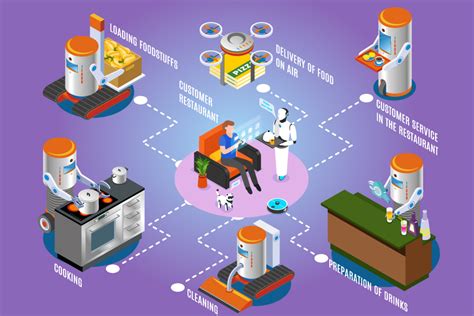Revolutionizing Taste: A Deep Dive into Artificial Intelligence in the Food and Beverage Industry
The food and beverage industry is undergoing a significant transformation, driven by the rapid advancements in artificial intelligence (AI). From farm to fork, AI is revolutionizing every stage of the process, promising increased efficiency, improved quality, and a more personalized consumer experience. This article explores the diverse applications of AI across the F&B sector, examining its impact and future potential.
AI in Agriculture: Optimizing the Source
Before the delectable dishes reach our tables, the ingredients must be cultivated. AI plays a crucial role in optimizing agricultural practices:
- Precision Farming: AI-powered sensors and drones monitor crops, analyzing soil conditions, weather patterns, and plant health. This data allows farmers to precisely target irrigation, fertilization, and pest control, maximizing yield and minimizing resource waste. This leads to higher quality produce and reduces environmental impact.
- Predictive Analytics: By analyzing historical data and market trends, AI can predict crop yields, optimize planting schedules, and mitigate risks associated with climate change and disease outbreaks. This ensures a stable supply chain and minimizes disruptions.
- Robotics: AI-powered robots are automating various tasks, including planting, harvesting, and weeding, boosting efficiency and reducing labor costs. This enhances productivity and addresses labor shortages in the agricultural sector.
AI in Manufacturing and Production: Enhancing Efficiency and Safety
Once the raw materials are harvested, AI continues to play a vital role in the manufacturing and production processes:
- Quality Control: AI-powered vision systems can detect defects and inconsistencies in food products, ensuring high quality and preventing contaminated products from reaching the market. This improves food safety and reduces waste.
- Process Optimization: AI algorithms can analyze production data to identify bottlenecks, optimize workflows, and improve overall efficiency. This leads to increased output and reduced production costs.
- Supply Chain Management: AI can predict demand, optimize inventory management, and streamline logistics, ensuring timely delivery of products and minimizing spoilage. This improves efficiency and reduces waste throughout the supply chain.
AI in Marketing and Customer Experience: Personalization and Engagement
The final stage involves reaching consumers and shaping their experience. AI is transforming how F&B companies engage with their customers:
- Personalized Recommendations: AI algorithms can analyze consumer preferences and purchasing history to provide tailored product recommendations, enhancing customer satisfaction and driving sales. This increases customer engagement and loyalty.
- Targeted Advertising: AI-powered marketing tools can identify ideal customer segments and deliver targeted advertising campaigns, maximizing the return on investment. This boosts marketing efficiency and improves campaign performance.
- Chatbots and Virtual Assistants: AI-powered chatbots can provide instant customer support, answer queries, and handle orders, improving customer service efficiency and accessibility. This creates a seamless and personalized customer experience.
The Future of AI in Food and Beverage
The application of AI in the food and beverage industry is still in its early stages, but its potential is immense. We can anticipate further advancements in:
- Food Waste Reduction: AI will play an increasingly crucial role in reducing food waste throughout the supply chain, from farm to consumer.
- Sustainable Practices: AI will help companies implement more sustainable practices, minimizing their environmental footprint.
- Personalized Nutrition: AI will enable the development of personalized nutrition plans and customized food products.
In conclusion, AI is poised to revolutionize the food and beverage industry, creating a more efficient, sustainable, and customer-centric sector. The innovations discussed above are just the beginning of what AI can achieve in this dynamic and evolving field. As AI technology continues to advance, we can expect even more transformative applications in the years to come.
